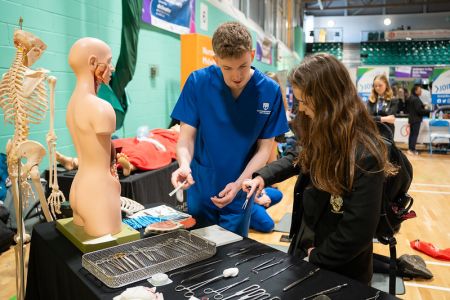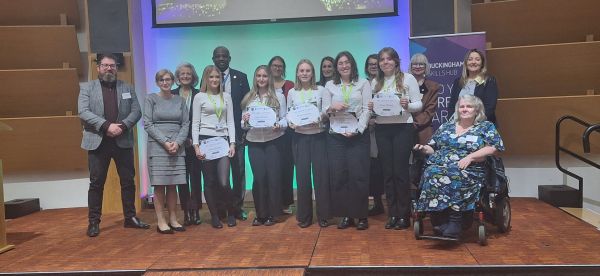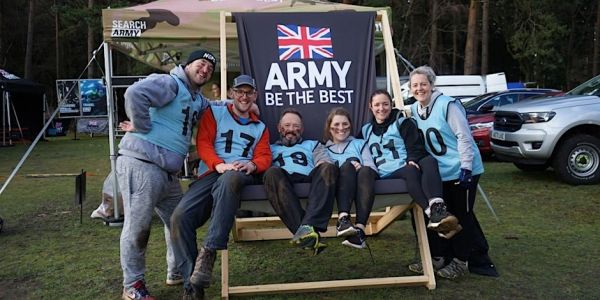- By Buckinghamshire Business First
- 2 August, 2024
Share by email
Talking Heads is the podcast from Buckinghamshire Business First that explores the business world in the ‘Entrepreneurial Heart of Britain’ through conversations with local and national business leaders and personalities.
Episode 16 - Building Homes, Breaking Barriers: Fairhive's Journey to Inclusivity
In this fascinating conversation, Philippa Batting talks with John Wallbank, the Assistant Director of People and driving force behind Fairhive Homes, whose vision is 'Homes for living, communities for life'.
Listen below.
About John Wallbank and Fairhive Homes
Described by Philippa Batting as “a company with a heart”, Fairhive Homes is a not-for-profit social landlord that focuses on providing affordable housing and currently supports over 20,000 residents. They invest all of their income back into social causes.
This episode explores Fairhive's role as a Disability Confident Employer and the concrete benefits that the scheme offers businesses, the transformative impact of fostering an inclusive culture, and Fairhive's merger with Buckinghamshire Housing Association. The pair touch upon Fairhive's collaboration with Talkback, shedding light on the UK's disability employment gap. And in a personal moment, John shares insights into navigating Type 1 diabetes.
Don't miss this episode for a thoughtful exploration of social responsibility and the powerful influence of fostering an inclusive culture.
About the Disability Confident scheme
The Disability Confident scheme supports employers to make the most of the talents disabled people can bring to the workplace. There are three levels - Disability Confident Committed (level 1), Disability Confident Employer (level 2), Disability Confident Leader (level 3) - which can be worked through by employers as they begin to increase their confidence. Participating in the Disability Confident scheme is free at the initial signup stage.
As you will hear in the podcast (and read about below), Fairhive Homes have achieved the highest level of accreditation. In fact, they are the only employer in Buckinghamshire to have achieved Disability Confident Leader (level 3) status. Last year, Buckinghamshire Business First achieved level 2 status, which you can read about here.
Some of the highlights from John and Philippa's conversation
Disability Confidence scheme - there are only upsides for employers to get involved
Philippa Batting: “Part of Buckinghamshire Business First's ethos is to encourage businesses to be part of their local community, to do the right thing. I remember being blown away, not in a good way, by the fact that here in the birthplace of the Paralympics, we have 85 businesses signed up to the Disability Confident scheme. That's less than a quarter of 1% of all the businesses in the county. And it's actually a really useful scheme to be a part of.
"And it speaks volumes that we only have one employer at level 3, so there is much to do. I spoke about how less than a quarter of 1% of our businesses are signed up to the scheme - we need to get that to at least 1% within the next 18 months. It is just such a wasted opportunity, because it's far easier than you realise, as a business leader, to accommodate people with different needs. I often talk in our organisation about my perfectly imperfect team, and that's because we've all got different skill sets, we've all got different lenses that we look at things through. In terms of nurturing every single individual for who they are and what they can bring to the organisation, the support is available to take a business on this journey. You're not on your own and there's everything to gain and nothing to lose from stepping towards it."
John Wallbank: "Disability Confident is a brilliant scheme, designed to help employers think differently about disability to help businesses attract, recruit and retain workers with disabilities.
"We've got so much to do to support people in the UK with disabilities. One in five of us are going to have an accessibility need in our lifetime, and almost 20% of the population is disabled, which is 14 million people. There's a UK disability employment gap of 29.8%. Now that means that only 52.6% of people of working age (between 16 and 64) with a disability are in work in the UK. That is compared to 82.4% of people in work without a disability.
The benefits of disability confidence - in the words of John Wallbank
"There are some really major benefits of the Disability Confident scheme for businesses:
"Commercial benefits - people with disabilities are likely to be loyal customers. They'll return to businesses they know are welcoming. and cater to their needs. When a business welcomes somebody with a disability, it also welcomes the wider social group including families and friends. This group has a combined annual spending power of £274 billion."
"Reducing employee turnover - we have got extremely low employee turnover and I think a key component of that is how we support our employees, our 'psychological safety', and the fact that we have an inclusive culture. The latest figures outline that if an employee leaves a company, it costs £38,000, and that includes the time to recruit and train a new employee. If we look after our employees with disabilities, arguably that turnover is going to reduce and we can see that evidence within our business.
"A workforce that reflects your customers and communities - recruiting and retaining people with disabilities creates a workforce that reflects the diverse range of customers we serve, and our communities.
"Building brand reputation - employing people with disabilities really helps your reputation and brand. Employees in the UK want to work for good ethical companies. Employees talk about where they work and employee advocacy is so key."
"I think the support offered on the scheme is exceptional. There is a team of Disability Confident Advisers at the Department for Work and Pensions (DWP), and they're supportive, engaging, they put that arm
of support around you. There's lots of people out there who will help."
A personal story of living and working with a disability
John Wallbank: “I'm somebody with a disability. I've got type 1 diabetes and I've had type 1 diabetes for over 30 years. It's a difficult condition to have, there is no cure. I've got a lifetime of taking thousands of insulin injections to keep myself alive. I live with diabetes every minute of every day. I'm always trying to hit a blood sugar target, which sometimes feels like trying to hit a bullseye on a dart board but the dart board is always moving. It is harder to live life with a disability.
"The Disability Confident scheme was so important for me because it's in our DNA as a business. One thing I really appreciate in Fairhive is that we have 'psychological safety', so I can just be fully open about my diabetes. We can bring our full authentic selves to work. And part of me is my diabetes. It's important that my colleagues around me know what to do in the event I become hypoglycemic."
Hidden disabilities and making adjustments
Philippa Batting: "I think in lots of companies there isn't an awareness of the hidden disability that is within their workforce, where people are really trying to perform despite a lot of challenges. Their disability is enhanced if the environment that they're working in doesn't make certain accommodations, or certain alterations for them. Businesses are not purposefully not doing the right thing, with malice aforethought, but I think that there's a lack of knowledge or confidence in terms of doing the right thing, saying the right thing, knowing how to make adjustments."
John Wallbank: "We changed our recruitment processes because of the Disability Confident scheme, What we do now is that on all of our adverts, we've actually got a recruitment disclaimer that says 'as part of our continued commitment to our workforce accurately reflecting the community, we welcome applicants with a physical or mental disability'. So we're really out there showing that we actively welcome people with disabilities to apply. And when applicants go through the HR processes we ask them whether they need any reasonable adjustments during the recruitment process, and they're always accommodated, We commit to offering an interview with an applicant with a disability if they meet 50% of the shortlisting criteria.
More about the disability employment gap
John Wallbank: "I would like to mention one charity again that was introduced to us through the Disability Employment scheme, and that's Talkback, one of the most inspirational charities in Buckinghamshire.
"The disability employment gap really depends on the condition you have. There's an employment rate in the UK with diabetes of 60%, which is better than average, but I still find that really heart-breaking that only 6 out of 10 people of working age with diabetes are actually in work in the UK.
"The condition with the lowest employment rate in the UK is autism. Only 16% of the autistic population in the UK are employed, despite 70-77% of the autistic population stating that they want to work. And that is why I'm so inspired by all the amazing work Talkback achieved. Talkback is an autism and learning disability charity, and they're such a force for good. They believe that everybody with the right support can find employment, and that could be through work experience, doing part-time work, or full-time paid employment. People with learning disabilities and autism offer so many advantages for employers, but above everything else, people with learning disabilities and autism deserve the same opportunities as everybody else."
The benefits of supported internships
About supported internships
Supported internships offer young people with Special Educational Needs and Disabilities (SEND) the chance to develop skills and achieve sustained employment. The benefits to businesses are also huge, including higher morale and productivity, and lower staff turnover and recruitment and training costs.
Buckinghamshire Business First has created a comprehensive guide with everything employers need to know. Download the Employer Guide to Supported Internships (PDF) >
John Wallbank: We created a supported internship for Thomas, who worked in our IT team for a whole academic year. He gained such invaluable IT experience, he strengthened his CV. We also ran interview
skills training with Thomas, increasing his employability potential."
Identifying positive role models within a business
John Wallbank: "We've got a very inclusive culture in Fairhive that's got real psychological safety, and one of the key things to look out for in businesses is: who are the positive role models? Are there any senior leaders in your business who will be open about sharing their disability? If leaders do it, if managers do it, then that creates that open culture for others to share their stories. A few years ago, I shared a video about living life with type 1 diabetes. That resulted in me having coffee with other colleagues who have got type 1 diabetes and we all got together and supported each other. Following my video, many others have followed. For instance, one of our employees shared his story about being deaf on International Deaf Day, and it was so well received by colleagues.
"And so, really think about how you can create that psychological safety so that employees with disabilities in your business can openly share that they have a disability."
Learn more about some of the topics raised in this podcast
- Read about the Disability Confident scheme and how your business can get involved
- Learn more about Supported Internships and how they can benefit your business, as well as a young person with Special Educational Needs and Disabilities (SEND)
- Discover more about Talkback, the Buckinghamshire-based autism and learning disability charity
Listened to our other podcast episodes yet?
There are lots more episodes to enjoy - you can find them all on:







